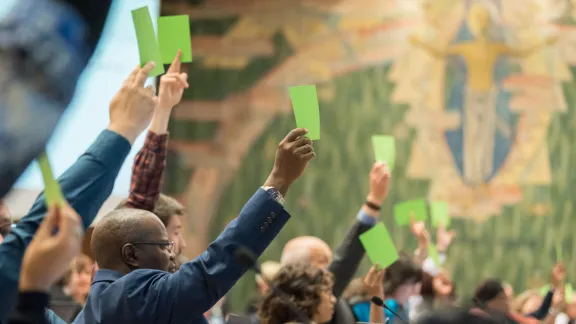
Council members voting on a new structure for the LWF Communion Office. Photo: LWF/Albin Hillert
Council approves a new LWF Communion Office structure
(LWI) - The Lutheran World Federation (LWF) Council today authorized a new structure for the LWF Communion Office (CO) that responds to the LWF Strategy 2019-2024, with a stronger focus on communion relationships, more synergy between theology, mission and justice, and increased collaboration, to better accompany the member churches as they witness and serve together in the world.
“This is about making sure we support the holistic ministry of the member churches, which includes proclamation, advocacy and diakonia. We are investing in the future and ensuring that we have a communion office that can deliver on our strategy and support our vocation to live and work together as a communion of churches,” said LWF General Secretary Rev. Dr Martin Junge.
We are investing in the future and ensuring that we have a communion office that can deliver on our strategy and support our vocation to live and work together as a communion of churches,
The structural changes will take effect on 1 January 2020.
Connecting theology, mission and justice
The goal of the changes is to ensure that the CO structure responds to the strategic directions of the 2017 Assembly which are articulated in the new LWF Strategy 2019-2024. The overarching objective is to strengthen connections of programs to member churches, and through that their participation in the overall journey of the communion.
A key change is the creation of a new Department for Theology, Mission and Justice (DTMJ) bringing together theological studies and member church-related program work and a new team in that department called Action for Justice. The new team will connect the work of DTMJ and the Department for World Service (DWS) in the shared thematic focus on human rights, interfaith and peace, gender justice and climate justice. The Department for Mission and Development (DMD) and Department for Theology and Public Witness will cease to exist. DWS continues to lead LWF’s global diaconal work.
The new structure introduces stronger focus on communion relationships. Regional secretaries, whose work has until now been lodged in DMD, will be a part of the Office of the General Secretary. They continue to be the primary entry point for member churches with the CO, supporting stronger relationships with the member churches, connecting local, regional and global expressions of the communion.
The new structure provides for theological reflection as a foundational part of LWF’s work. The Department for Theology, Mission and Justice will also support the member churches in the inclusion of youth and women in all areas of church life and work.
“It is our belief and ongoing prayer that the new structure will enable us to serve in responsive, effective and sustainable ways and deliver on the communion’s foundational commitment to doing theology together, supporting each other in mission, working for the unity of the church and supporting people in need,” the LWF general secretary said in conclusion.
The 2019 LWF Council meeting takes place in Geneva from 13 to 18 June. The theme of the Council is “Because we know God’s voice” (John 10:4). The LWF Council meets yearly and is the highest authority of the LWF between assemblies. It consists of the President, the Chairperson of the Finance Committee, and 48 members from LWF member churches in seven regions.


